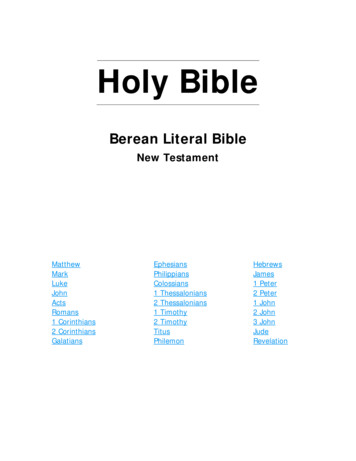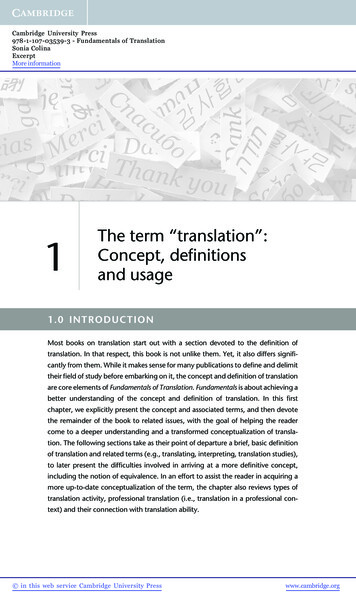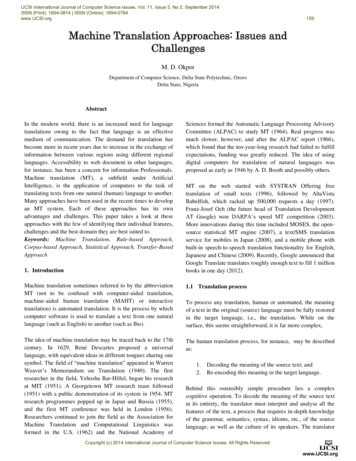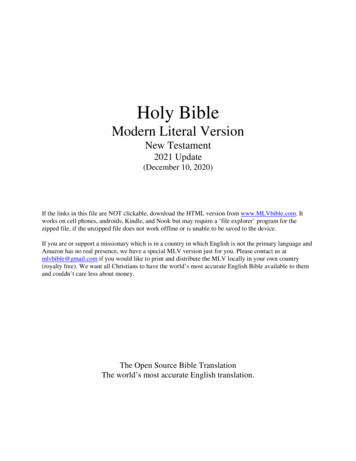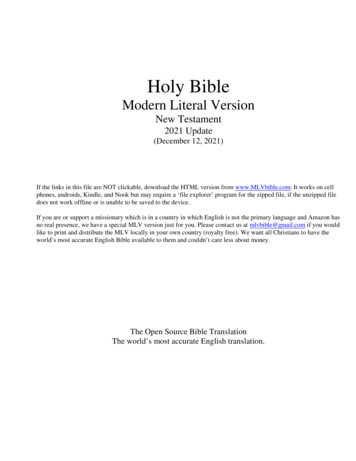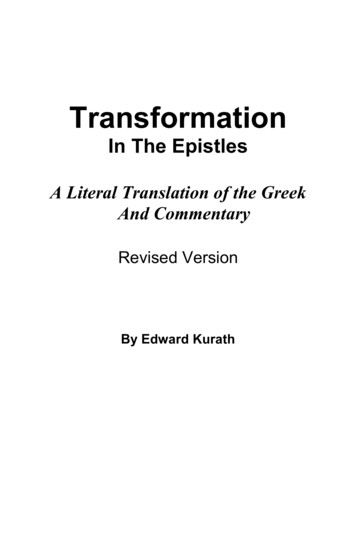
Transcription
TransformationIn The EpistlesA Literal Translation of the GreekAnd CommentaryRevised VersionBy Edward Kurath
2Transformation In The EpistlesRevisedCopyright 2019 by Edward KurathPublished by: Divinely Designed24326 Winder Place, Golden, Colorado 80403www.divinelydesigned.comThis book is copyrighted, but you may make quotations from itwithout prior written permission of up to 40,000 words of thecontent, provided that a proper acknowledgment is made regardingthe source, as follows: From “Transformation In The Epistles” byEdward Kurath, Copyright 2019 by Edward Kurath.ISBN 978-1-7923-0223-7First printing April 2019Printed in the United States of AmericaCopyright Permissions:All scripture quotations, unless otherwise indicated, are taken from the New KingJames Version Copyright 1982 by Thomas Nelson, Inc. Used by permission.All rights reserved.We have also made extensive use of the World English Bible by Johnson, MichaelPaul, Kihei, Hawaii: Crossreach Publications. That Bible translation is notcopyrighted, but the publisher asks that we give them credit wherever we use theirwork.Quotations from Zodhiates, taken from “The Complete Word Study Dictionary”by Spiros Zodhiates, Copyright 1992 AMG Publishers. Used with permissionof AMG Publishers, 6815 Shallowford Rod., Chattanooga, TN 37421.Endnotes #1, 2, 3, 4, 5, 6, and 7 are quotes from “I Will Give You Rest,”Copyright 2003 by Edward Kurath, Post Falls, ID.Endnotes #8A through #8K are quotes from “Exceedingly Great And PreciousPromises,” Copyright 2012 by Edward Kurath, Post Falls, ID.
3 Transformation Works!The provisions that we have been given through Jesus Christ reallywork.They are intensely practical, and will change our lives in this sinfulworld.However, if our lives are going to be changed, we need to be taughtHOW to appropriate His provisions.The Epistles of the New Testament reveal them, but translating theGreek into English in the past has resulted in a loss of understanding.Endnotes #1 through #7 in this book teach these principles in simplelanguage. I first presented these principles in this way in a prior bookof mine, I Will Give You Rest.Below are some testimonies about how Jesus used these principles, aspresented in I Will Give You Rest, to help Christians appropriate intotheir lives what He has provided.This Translation and commentary will show you how important theseprinciples were to the first century church.See What Others SayBy Lindsay Rosenthal (Idaho)“All I can say is this book changed my life. It changed my whole family . . For the first time in my life I am truly living. I have a freedom and apeace that most people spend their whole lives striving for.”By B. O. (Dublin, Ireland)“Having struggled with depression, phobia, and shame, I am nowexperiencing lasting hope, freedom and peace in my heart . . .”By Larry (California)“The book ranks among the best I have read in my life. Next to the Bibleitself, it may be the best. I would highly recommend it to others”By R. B., counselor and teacher (Jacksonville, Florida)“Something happens when it is either read or told; it captivates and movespeople. I have read the book several times and have highlighted it so whenI teach I am simply telling the highlighted parts. It's anointed. I am findingin all of my groups that we end up with Ed's book even if we start withsomething else. People who have been in such bondage for so long areseeing the light.”
4By CK“This book has been the most influential book in my life outside the Bible.I have given it to 4 people who also find it very helpful.”By Mikka Paanannen (Turku, Finland)“We have been going through your book in our Living Waters group inTurku. There is a treasure buried in your book that we are eagerly diggingand taking hold on. And that is the treasure of THE GOOD NEWS, THEGOSPEL to those who suffer of brokenness.”By Nancy (Centreville, VA)“At last, I have discovered the answer to so many of my struggles in EdKurath's book. After years of treading a path to the self help section of mylocal book store (with no significant change in my life), I wasrecommended I will Give you Rest. This book has made an enormousimpact in my ability to understand my past, see why I kept experiencingreoccurring wounds and learn why I was not able to gain inner healing andlasting change. I thank God for the manner in which Ed communicates theprinciples in this book. I am amazed how I kept missing God's invitation toheal me throughout my life. I tell others' it is so simple, I missed it! Pleasedon't miss your opportunity for the most amazing transformation andparadigm change you will ever experience. My relationship with God, myfamily, friends and myself have been significantly enhanced. My life istransforming in the most blessed way. Thank you so very much, Ed!!”By Amazon readerEd Kurath is the best example of a Christian who takes his own journeyand personal pain, then turns it into the means to do ministry to others in away that is compacting and lasting. This book is simply-written andprofound from cover to cover. I first became emotionally healed fromapplying the truths in this book to my own life, then have used it to mentorwomen down through the past 12 years or so. I would recommend thisbook to counselors, ministers, lay-ministers and anyone who just wants toattain the freedom to which Christ is calling them. I keep copies of it onhand for friends and family.There is a way to win the spiritual war you are in.Jesus will show you HOW in the Epistles!
5Table of sRomans1 Corinthians2 1 Thessalonians2 Thessalonians1 Timothy2 TimothyTitusPhilemonHebrewsJames1 Peter2 Peter1 John2 John3 dnotes Numerical IndexEndnotes Alphabetical IndexResources & Contact Information544871834837843849
6ForewordWhy another translation and commentary? Aren’t there thousandsalready? What can possibly be said that has not already been said?No other commentary I have ever read asks and answers the questionsof my heart the way this one does. This literal translation andcommentary devotes itself exclusively to focusing on what theepistles of the New Testament tell us about the process of Godtransforming us into the image of Jesus. This is the process by whichGod matures us in Christ so that we are no longer children tossedabout by every wind of doctrine, the trickery of men (Ephesians 4:14),or every wind of our culture. The author goes into great detail toexplain the nuts and bolts of HOW we can become like Jesus, howwe can exchange our sin for His holiness. He also exposes how ourculture subverts us in our efforts to do this.This book is not for anyone seeking an easy, safe ride into theKingdom of God. It cost Jesus everything to do God’s will. He gaveup His life to bring us into relationship with His Father. FollowingHim will cost us everything that stands in the way of our obedienceto God. Why? It’s simple: everything that stands in the way causesus pain and loss.How do I know that? I learned the hard way, the same way any of uslearn. Doing all the outward things in life that supposedly please God,I checked off everything on my list: working hard every day, praying,tithing, going to church every Sunday morning, Sunday night andWednesday night. In addition, I attended a women’s prayer meetingweekly on Tuesdays. I took class after class at church on how toimprove myself as a Christian. I studied my Bible and took Bibleclasses in my church. Despite such monumental effort anddedication, the life of peace and joy escaped me. I came up emptyhanded! I was on medication for depression for approximately 20years. I was in counseling twice a month for many of those years. Iread Christian self-improvement books like my Dad used to read thenewspaper: every single day. My church prayed with me. They were
Foreword7compassionate. But even they could not figure out the cause of mysuffering. They could not discern my problem, nor could I. It nevergot any better. It got much worse.Why did this intense expense of energy and thought not achieve in methe perfect Christian life and experience?God had a better plan. In total desperation, I made an appointmentwith Edward Kurath, the prayer counselor who authored this book.Ed’s office was eight hours away from me, so I took a week’s vacationfrom work to do a week of intensive counseling with Ed. Intensivecounseling is where you are in one-on-one counseling for three hoursa day for five consecutive days. Each day you spend in counseling,you devote an additional three hours alone with just yourself andJesus doing a homework assignment Ed gives you, which is always aprayer assignment: talk to Jesus about this, ask Him about that. Listento what your heart is telling you.My heart? My heart? What does that have to do with anything?It turns out my heart had everything to do with everything. I waseaten up inside with self-condemnation compounded with tons oflegalism. I had mercy for everyone on the planet except myself. Jesusknew! Jesus met me in Ed’s office and began His work of healing meand setting me free from self-condemnation, religion and legalism.Jesus showed up! He is about relationship, not performance. Jesusopened my spirit, soul, mind and heart to His love for me. Jesus cameinside my heart. With His help I began to love myself and forgivemyself. I am seven years into this journey. Nothing compares toJesus on the inside of me. He is ever with me, continuing to set mefree from the darkness that had bound me.The foundation that Jesus gave me is the process of sanctification. Itappears in detail in Endnotes #1 through #8 of this book. All of theseprinciples are very prominent in this book only because they are veryprominent in the New Testament Epistles. This teaching is nothingnew, though much of it may seem new to you, for our traditions andour culture have hidden much of the understanding and experience oftransformation from our sight. This book is revealing only what the
8ForewordScriptures reveal, the path of becoming holy, God’s great and lovinggoal for each of us.Inside this book you will find Truth, which is the Bedrock of theSpirit, deep things, life-changing things, things no one would tell you(not because they were withholding from you but because they didnot know), the secrets that bring you peace and restore your soul. Youwill find hard things here, but always served with an abundance ofgrace! The hard things will sharpen you, as iron sharpens iron. Thereis no good Jesus will not do for you. He gave His life for you, not tocondemn you, but to set you free of all that binds you and to releaseyou into all that is holy and good.We cannot know ourselves apart from Him abiding in us, revealingus to ourselves. That’s the only way He works and the only way wework. There is nothing within you He does not know. Everythingyou need for this journey is still within you, no matter what you mayhave lost. Taste and see! He will reveal Himself to you, and revealyou to yourself. In that revealing He will heal you deep inside.My prayer for you is that you may read this book with the eyes of achild, receive from it what you need in your journey with Jesus, andbe made whole!Christine MolderAmmon, Idaho
9PrefaceBecome NewHow is “Transformation” the “Goal?”Let’s let the Apostle Paul answer that question:“So that if any in Christ (is) a new creation, the old passedaway. Lo and behold, the all new has begun to be” (2Corinthians 5:17 my literal translation, underlining added).“For in Christ Jesus neither circumcision is availing anything,nor uncircumcision, but a new creation” (Galatians 6:15, mytranslation, underlining added).The Good News, the central provision that Jesus provides for us, isthat we can be in the process of becoming new. We can be becominga new creation. We can be in the process of being transformed intothe image of Jesus.This Is A MiracleThis “new creation” is a miracle that only Jesus can perform.This was the goal for the Apostle Paul:Not that I have already attained, or am already perfected; but Ipress on, that I may lay hold of that for which Christ Jesus hasalso laid hold of me. Brethren, I do not count myself to haveapprehended; but one thing I do, forgetting those things which arebehind and reaching forward to those things which are ahead, Ipress toward the goal for the prize of the upward call of God inChrist Jesus (Philippians 3:12-14, underlining is mine).Clearly, here Paul is saying he is in process, and the goal is to beperfected – to become a new creation.
10PrefaceHow Can This Miracle Happen?How can Jesus do this in us? By taking away our sin and replacing itwith His Spirit.In what we call “The Lord’s Prayer,” in Matthew 6:13, Jesus explainsthat our Father in heaven has the authority to take away our sins:. . . yours is the kingdom and the power and the glory forever.Amen (Matthew 6:13).Based upon this, there is then a condition:For if you forgive men their trespasses, your heavenly Father willalso forgive you (Matthew 6:14).The Greek word translated in verse 14 as “For” is “gar.” It means:“where the latter clause is dependent on the former.” 1 Our beingforgiven of our sins is dependent on God’s ability to forgive, but beingforgiven also requires us to first forgive others. If we will do that,then it is guaranteed it will happen! 2Being forgiven of our sins is thevery center of the Gospel!And in the very next verse, Jesus also explains what happens if we donot forgive:But if you do not forgive men their trespasses, neither will yourfather forgive your trespasses (Matthew 6:15).In other words, without forgiving and being forgiven, we are stuck inour sin; and we will suffer the just consequences.12Strong’s #1063, Zodhiates, page 357.For much more on “The Lord’s Prayer,” see Endnote #25.
Preface11This is serious business, and everything else in the life of a Christianis secondary to it!Jesus came to provide the way to take away our sins. Before Hissacrifice, mankind was stuck in their sins; and that was a very badthing:For the wages of sin is death (Romans 6:23).But the gift of God is eternal life in Christ Jesus our Lord (alsoRomans 6:23).“Salvation” Has Two PartsThis salvation He has given us has two aspects:1. First, there is the one-time event when we made Jesus Christour Lord. It is called salvation. We then receive His Spirit inus.2. Then there is the ongoing process by which He takes away oursins. This is a lifelong process. It is also referred to assalvation, but also as sanctification and transformation into theimage of Jesus.When we give our lives to Jesus, that does not automatically takeaway all of our sins. It does make Him our Lord, which means weare now His property (1 Corinthians 6:19-20). This then gives Himpermission to begin the ongoing process of our sanctification. Thatongoing process by which Jesus takes away our sins requires us toforgive so we will be forgiven, as stated in Matthew 6:14 above.For more, see Endnote #5J, “Being ‘Saved’ Has Two Meanings.”A SurpriseThere is a surprise in store for you. The literal Greek Epistles do notexhort you to try hard to be good. The writers knew that attemptbrings failure and frustration. See Endnotes #1A through #1H.Instead, they admonish you to be transformed into the image of Jesus.
12PrefaceThen you will have good behavior, because you have become goodlike Him.Purpose Of This TranslationThe sole purpose of this translation and commentary is to show howthe Epistles of the New Testament emphasize the importance of thislifelong process of sanctification.As you go through my translation, you may wonder why Iso frequently talk about sanctification, the processwhereby we can be transformed into the image of Jesus.The answer is simple: I mention itso much because the writers ofthe Epistles mentioned it somuch. In fact, it was a majorreason why they wrote theEpistles in the first place!Transformationinto the image ofJesus is the maintheme of most ofthe epistles.Hopefully, their emphasis on sanctification will impressupon you how very important it is.You will also notice that although the writers put a great deal ofemphasis on the IMPORTANCE of sanctification, there is lessemphasis on HOW to be sanctified (though HOW to do it is alsopresent).There are two reasons for where they put their emphasis:1. The readers had already been taught in person HOW toaccomplish sanctification, so the writers of the Epistles didn’thave to talk a lot about HOW. 33There is strong evidence that all of the churches to which the Epistles wereaddressed had been founded by or visited by an Apostle or one of their disciples.The Pastorals were addressed to disciples of Paul. Since forgiveness of sins is thefoundation of the Good News, there is no doubt that the Apostles or discipleswould have taught all the Christians HOW to be sanctified through forgiveness oftheir sins.
Preface132. The readers were being influenced by legalists, includingJews, who were trying to get these churches to abandonsanctification and begin to obey a set of rules to please God.This problem needed to be stopped, and thus the writersemphasized the IMPORTANCE of sanctification. TheChristians were in danger of drifting away from theirsanctification, as expressed in Hebrews 2:1-3We are all influenced by our culture. It is a subtle perspective of lifeof which we are usually not aware. In the Western world, that meansthat we think that we are fundamentally logical beings, and so wehave the power to decide for ourselves how to manage our lives. TheChristian church and most members see the scriptures through thosecolored glasses. The English translations we have of the Greek NewTestament were influenced by that mindset.That mindset is not at all how God sees reality, and is not the Hebrewview. The most powerful forces affecting our lives are below ourlevel of conscious, rational thought. That is why so many “rational”people do the things they hate. Paul addressed this when he wrote:For what I am doing, I do not understand. For what I will to do,that I do not practice; but what I hate, that I do (Romans 7:15).Has this ever been your experience? Many Christians feel likefailures because of this Western Mindset. They memorize Bibleverses (which is good), and then they try to live up to these verseswith their will power (which doesn’t work). When they fail to dowhat they intended, they feel condemned. What drives thecondemnation deeper is that, tragically, this striving is what is usuallytaught in church. Since the authorities tell them to try hard to be agood Christian, they believe them. This drives their guilt and shamedeeper. After all, if this is how everybody else does it, why can’t I?You feel wretched. The pain of constant failure is excruciating! Manypeople in churches live in this constant pain, which often leads to selfcondemnation, depression, resignation, and hopelessness.
14PrefacePaul knew you would fail, and echoed what you were feeling in yourfailure:O wretched man that I am! Who will deliver me from this body ofdeath? (Romans 7:24).It may surprise you to realize that you are not alone in your dilemma.Fortunately for us, Paul knew that we needed a spiritual solution tothis deadly trap:I thank God – through Jesus Christ our Lord (Romans 7:25).Then, in the rest of the book to the Romans, he goes on to explainHOW we can have Jesus Christ deliver us from “this body of death.”This transformation is also a key theme of most of the Epistles in theNew Testament.
Introduction15IntroductionChristianity Is Indeed Unique.There are some who see Christianity as just one of the great religionsof the world.They are profoundly wrong!No other religion, including Torah Judaism (which believes in thesame God), has a cure for sin. 4 All humans sin.Sin is destructive.The Law of Moses wasn’t very effective in taking awaypeoples’ sins. God had to provide a better way.Jesus then came to take away our sins.This an ongoing process as long as we are on this earth.We need to forgive so we will be forgiven.Jesus is always with us to guide us through this process.This process is called sanctification: it is our transformationinto the image of Jesus.There is no other cure for our sin problem.This “transformation into the image of Jesus” makes us a newcreature; and to the degree this occurs, we behave more and more likeJesus. Our good behavior is then spontaneous and effortless, becauseit is more and more our new nature producing the Godly behavior.This process is the second part of our salvation, and is also referred toas “sanctification,” and “salvation.”4See Hebrews Chapters 7 through 10, especially Verses 7:19, 8:7, 9:28, 10:10.
16IntroductionWhy Is Transformation Into The Image Of JesusA Miracle So Very Central to the Christian Life?As mentioned in the Preface, there are two aspects of “salvation,” twogreat gifts that the Lord Jesus Christ provides for all people, if theywill accept them:The first gift is a one-time event. This occurred when you madeJesus your Lord. You now are a child of God with all of the privilegesand equipping that entails. You then receive His Spirit into you. Thisevent includes life eternal (when you die, you will go to heaven).The second gift is an ongoing process. It is the provision for you tobe transformed into the image of Jesus. As He takes away your sins,you become a partaker of the divine nature. You actually acquire Hischaracter! It is a process that you appropriate daily for the rest of yourlife. This provision gives you victory over sin now, in this life.For a Christian, the gift of the one-time eventhas already occurred. Then the Christian life isall about the second gift: the ongoing processof sanctification, the taking away of our sins.If You Are Not a ChristianIf you are not a Christian, and you would like to inherit these twoblessed gifts, you can very simply accept Him as Lord. The Biblesays:That if you confess with your mouth the Lord Jesus and believein your heart that God has raised Him from the dead, you willbe saved (Romans 10:9).It is very simple. Just say something like: “Jesus, I believe that Youare the Christ, the Savior, and that God raised you from the dead.
Introduction17I ask You to become the Lord of my life. I surrender myself to You.” 5And right then He will accept you into the family of God!This process of sanctification is the only direct challenge to Satan’skingdom in this world. He realized that the most important thing hehad to do was to bury this miraculous provision. Sin opens people upto destruction by him.Also see “Salvation” in the Glossary.The Only Alternative Is LegalismLegalism is a clever counterfeit for producing good behavior. Theintellect and the will are the tools to do it this way. As fallen humans,doing this is very appealing. In a sense we then become our owngods, in control of our own lives by our own choices. Satan realizedthis about human beings, so he used this vulnerability to keep men inbondage to sin.Legalism does not work. In fact, it in itself is sin. In trying to be goodin our own strength, we are trying to take the place of Jesus by doingwhat only He can do.The Epistles Are Our GuideThe Epistles of the New Testament are the letters that are pertinent toour lives as Christians. Until the Holy Spirit was sent into men in thesecond chapter of Acts, we were not equipped to live this new life.Taking away our sin is why Jesus Christ was sent.5A more extensive prayer that explains more completely your change in statusmight be: “Dear Father God in heaven, I come to you in the name of Jesus. Iacknowledge to You that I am a sinner, and I am sorry for my sins and the life thatI have lived; I need your forgiveness. I believe that your only begotten Son JesusChrist shed His precious blood on the cross at Calvary and died for my sins, and Iam now willing to turn from my sin. You said in Your Holy Word, Romans 10:9that if we confess the Lord our God and believe in our hearts that God raised Jesusfrom the dead, we shall be saved. Right now I confess Jesus as the Lord of my life.With my heart, I believe that God raised Jesus from the dead. This very moment Iaccept Jesus Christ as my own personal Savior and according to His Word, rightnow I am saved.”
18IntroductionSince the Epistles are the messages to the Christian church after theHoly Spirit was given, they are our guide to the importance oftransformation into the image of Jesus, and are our primary guide asto how to accomplish that.The Epistles were written to Christian churches. Each church hadbeen personally taught about the Christian faith. They had beentaught in person by an anointed teacher, usually an Apostle. Becausethose personal meetings were not recorded, we don’t knowcompletely what the churches had been taught in person. But we canreasonably assume that forgiveness of sins was a major emphasis,since the reason that Jesus Christ was sent was to provide forforgiveness of our sins.Each Epistle was writtenMost of the epistles werelater on to addressfocused on the importance ofspecific problems thatsanctification, because thosewere arising in a specificchurch. From them wechurches knew HOW to becan clearly see thatsanctified, but were driftingSatan was already ataway from practicing it.work trying to take awaysanctificationandsubstitute legalism, and so the Epistles greatly emphasize theIMPORTANCE of becoming Christ-like. 6 There is less emphasis onHOW to be sanctified, because the writers knew the churches hadalready been given hands-on, in person, step-by-step instruction aswell as practice in repentance, forgiveness, and being forgiven. Sothe primary purpose of the Epistles was to remind them to not letthemselves be deceived and robbed of this miraculous provision theyhad been given.It is also true that the Epistles are the only information we have aboutthe life of the first century Church. Because of the Epistles’ limited6Transformation into the image of Jesus is addressed 190 times in the Epistles.The Epistles in my NKJV Bible take 154 pages, so, that is more than once perpage on average (Kurath, Exceedingly Great and Precious Promises, page 85).
Introduction19purpose, there is a great deal we do not know about what went on inthe churches as the Apostles taught them in-person. We need to gleanwhat we can from what they wrote in the Epistles.After the Apostle John died, the Christian church fell into legalism. 7The concern of the writers of the Epistles was validated, and Satanhad accomplished this purpose.My Emphasis On Sanctification 8Since sanctification is the very center of Christianity, my purpose hereis to bring this out whenever it is present in the Epistles.Unfortunately, most English translations do not bring out thisfundamental process of forgiving of our sins and the resultingtransformation into the image of Jesus. The Greek is anointed by Godand is much clearer. This translation and commentary are intended to7“The knowledge that the gift of grace (Paul) or of God’s love (John) makes a manradically new is lost. Gone is the knowledge that a man without God’s grace is avictim to the power of sin and death, that he has lost his freedom and is living indisobedience to God even if his conduct be correct, because God’s law is to him ameans of asserting himself before God. Vanished is the knowledge that his releasefrom the powers that controlled him is a release to genuine obedience, but that he isnever cast loose from the giving and forgiving grace of God nor left to rely uponhis own strength.”(Bultmann, Theology of the New Testament, Part II, page 204;also see pages 215-216). Satan immediately began to attack this law of liberty tobring people back into bondage to the Law. He knew that it was deadly for us totry to keep the Law in our own strength. The Epistles were written specifically tocounteract this attempt to destroy what Jesus did to save His people. Unfortunately,shortly after the death of the Apostles, most of the "church fathers" fell back intobondage to legalism (Bultmann, Theology of the New Testament, Part II, pages215-216). This is one of the reasons why we all have struggled so hard to be good,and have failed over and over again.8You will note that I have already used both “transformation into the image ofJesus” and “sanctification” to refer to this process. As you read the Epistles, youwill see that the authors used several way of referring to the process. Examplesare: becoming a “new creature”, to partake of “His divine nature,” becoming a“partaker of His holiness,” and being made “perfect.” In some Christian circlesthe process is sometimes referred to as “inner healing,” although that term is neverused in the Epistles. You do not need to be concerned or confused by thesevarious terms, because I have made it a point to elaborate whenever this process isbeing referred to.
20Introductionbring out the meaning that is present in the Greek. I am verycommitted to not trying to make the Greek say something that it is notsaying. In order to do this, I have made my translation literal ratherthan a paraphrase; and sometimes this results in a translation that isnot smooth English. In my view, accuracy is more important thanreadability.In my commentary I have focused on sanctification. There are manyother theological issues that I have not commented on, such aspredestination, forms of baptism, the Lord’s Supper, etc. These otherissues may have importance, but I am not here attempting to answerevery theological issue present in the Epistles; and frankly, I am notqualified to answer questions about many of those other issues.My purpose in writing this translation and commentary is to help youto understand in depth what the writer of each Epistle was saying. Myhope is that you will then begin to realize that becoming a p
You will find hard things here, but always served with an abundance of grace! The hard things will sharpen you, as iron sharpens iron. There is no good Jesus will not do for you. He gave His life for you, not to condemn you, but to set you free of all that binds you and to release you into all that is holy and good.



